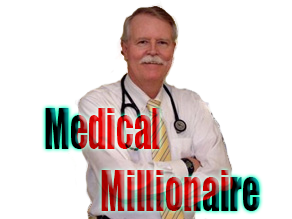The title of this article , “The Riches Are In Niches”, is from a phrase I heard while listening to CNBC in the background one day in my office. The on-air discussion at the time was in reference to the stock value of companies. Specifically, the companies that did one thing very, very well were worth more to investors than companies that did a lot of generic things that could be commoditized.
, “The Riches Are In Niches”, is from a phrase I heard while listening to CNBC in the background one day in my office. The on-air discussion at the time was in reference to the stock value of companies. Specifically, the companies that did one thing very, very well were worth more to investors than companies that did a lot of generic things that could be commoditized.
Unfortunately, for primary care doctors, we have become marginalized as “providers” and frequently referred by insurance companies and hospitals alike as PCPs. Even if you do your job very well and do an excellent job for your individual patients, you are not worth anything more to your hospital employer and group.
In fact, many primary care doctors are discovering this sad truth for themselves as they are retiring. Despite the fact that there are fewer doctors going into primary care, these doctors are are being replaced by nurse practitioners or physician assistants, a.k.a. “mid-levels”.
From an economic point of view, the marketplace is saying that your generic medical services are not worth as much as you thought, and that it can be replaced by a lower level provider. I say this not to demean or insult mid-level providers.
I have met and worked with many mid-level professionals over the years who are very smart and learn by experience. However, there is a reason that they are mid-level: they have not had the extensiveness of training or the ultimate accountability of the board-certified and credentialed doctor.
Be that as it may, if you take this signal from the marketplace and want to accumulate more income, you must become more valuable. The medical system reimburses the doctor better who becomes more specialized in his field, or does something specific that few others do.
 This trend happens everywhere in medicine. For example, the cardiologist that does cardiac catheters is paid better than the office-consulting cardiologist.
This trend happens everywhere in medicine. For example, the cardiologist that does cardiac catheters is paid better than the office-consulting cardiologist.
How did I implement this philosophy in my internal medicine practice? I always enjoyed doing procedures during my medical school years, residency, and early practice days.
When my group was growing up to 6 office providers at one point, I noticed that many of my colleagues were referring out procedures that I was performing on my individual panel of patients. So, I went to each provider and offered to see their patients for the small procedures that they did not do.
It would keep the patient in-house, and I would guarantee that I could get them in my schedule faster than any outside specialist. As a result, I became the “lumps and bumps” doctor in my group.
My RVUs went through the roof! Already the most efficient doctor in my office, I was seeing more patients with higher value reimbursements.
Since our income was based on productivity, my income continued to increase while those providers who just kept doing the same old primary care thing stagnated. There definitely were more riches in that niche.
 The most interesting aspect of being in a niche is that once you are in one, you can see other possibilities to niche down further. While dealing with a large number of patients for skin procedures in the early 2000’s, I fielded lots of questions about other new procedures in which they were interested, including Botox, fillers and lasers.
The most interesting aspect of being in a niche is that once you are in one, you can see other possibilities to niche down further. While dealing with a large number of patients for skin procedures in the early 2000’s, I fielded lots of questions about other new procedures in which they were interested, including Botox, fillers and lasers.
While attending continuing medical education on skin procedures, I met other doctors who were essentially doing the same thing. Over meals and breaks, I brainstormed and found kindred spirits who stimulated my medical entrepreneur side to help me explore these areas further.
To make a long story short, I developed a separate practice on the side and in my spare practice time to do aesthetic procedures, as most of these techniques are not reimbursable by insurance companies. At first, I was nervous about leaving the insurance world. Later, I found out that this move was in fact liberating.
 By going into a cash-only niche, I didn’t have to fight with insurance companies about medical necessity or delay in reimbursements. If someone wanted a procedure such as Botox, I would tell them how much that procedure would cost, and that person would simply choose to pay the price or not.
By going into a cash-only niche, I didn’t have to fight with insurance companies about medical necessity or delay in reimbursements. If someone wanted a procedure such as Botox, I would tell them how much that procedure would cost, and that person would simply choose to pay the price or not.
By niching down, I became more valuable to the marketplace. By eventually shedding the health insurance handcuffs, I was able to be reimbursed for more of what I was doing, and not be obligated to pay for overhead to get the money I am owed.
I am living proof that the riches are in the niches. As a result, I can control my own destiny, and it is one of the best professional steps I have ever taken!

